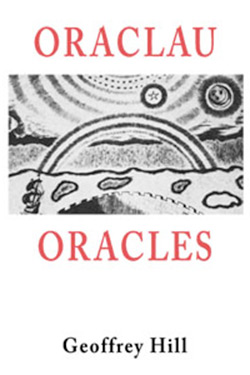Oraclau | Oracles
by Geoffrey Hill
reviewed by Paul Franz
Setting aside the various pamphlets and retrospective collections that have appeared over his long career, Oraclau | Oracles is somewhere between Geoffrey Hill’s fifteenth and twentieth volume of poetry. The uncertainty of the count reflects Clutag Press’s announcement that Hill, who at almost eighty has recently begun a five-year term as Professor of Poetry at Oxford, has “completed five new collections” since 2007’s A Treatise of Civil Power. Despite appearing first, Oraclau | Oracles is Part III of this series, collectively titled The Daybooks. If this lack of context makes first responses tentative, Hill’s latest publication nonetheless reveals itself, even in isolation, as a problematic yet compelling return to the genre of the book‐length poem, exploring its author’s central concerns with landscape and history, language and context, gravity and grace.
As the series title The Daybooks suggests—and extracts from the fourth collection in Poetry (Chicago) reinforce the impression—this work does not present an argument, either discursive or narrative. Instead, its 144 stanzas, their seventeenth‐century frameworks retrofitted with slant rhyme and variable stress, perform a sequence of oblique meditations on interweaving themes. While this accretive sense of the “daybook” is familiar from twentieth‐century American poetry, Hill’s use of the term also involves resonances specific to his project. In the first place, we hear the positive space of day set against night’s negation. But there is also, for this poet whose work has long engaged notions of “sufficiency” and “evening the equation,” an echo of the word’s historical sense as a record of daily transactions. The Welsh and English synonyms of the volume’s title point to a larger effort at balancing the books. Responding to a sense of cultural debt, the work draws into its orbit Welsh writers, artists, and politicians; English writers inspired by Wales (Gerard Manley Hopkins is a recurring presence); as well as the Welsh historical experience of political, economic, and environmental subjugation. The resulting texture is not unlike the dense “conglomerate,” or composite rock, from a landscape early in the book that also rather overtly evokes the poet:
These afternoons when rain‐mist brings the sea
Closer to the grey house set in its vee
Between hills of coarse‐clad conglomerate
Where twice‐blossoming gorse abides its state.
A similar impulse may be seen in the poem’s language, which embeds many Welsh words—such as hebog “hawk” and hiraeth “longing, nostalgia”—in the English matrix. In a more fundamental sense, however, it is the book’s formal structures of rhyme, line‐length, and rhythm that carry on the struggle toward equilibrium. Though never more than partially externalized, the compressed allusions and abstractions, alternating with flashes of powerfully fresh observation—“in westward place the black cloud / Jettisons candescent lesions”—project thought and feeling into the sensory realm. A vivid analogy of such creation appears in Hill’s lines on the nineteenth‐century civil engineer Isambard Kingdom Brunel: “from the Avon gorge / The mathematics of Brunel emerge / Into light’s buffeting, the winds at large.” By a form of the alchemy that is a pervasive motif in this volume, Hill’s consideration of such specifics leads him to consider the grounds of his own activity: “As lacking something so I have made art — / The management, the formalities, / Working a transmutation of report.” When he writes of poetry’s sometimes estranged sibling, “Of consummated fulness to be drawn: / It was not there philosophy began,” he could as well be describing his own art. Such passages point to one of the volume’s central, half‐submerged themes: poetry as desire. Characteristically, Hill responds to this undercurrent with an ambivalence occasionally turning caustic, as in the following extract, which also showcases his work’s frequent zest for far‐fetched rhymes:
I well know —
I think I do — that to will flaw
For the beauty that amends
Is aestheticism,
Spiritual pride, a touch of s.m.
For the effete nervous system.
It is not only their formulae of hesitation (“I well know — / I think I do —”) that link these lines with a reflection, from earlier in the volume, on flaw in a theological sense: “Wales: are you in happier condition — / I trust so — by grace of Original Sin?” As so often in Hill’s work, the thought here turns upon a set of uneasy parallels between aesthetic and theological flaw and grace, a constellation memorably condensed in his early poem on the poetic vocation, “God’s Little Mountain,” from 1952’s For The Unfallen: “Now I lack grace to tell what I have seen; / For though the head frames words the tongue has none.” Fortunately for Hill’s readers, the paradox of those lines, their eloquent disavowal of eloquence, finds many analogues in his current work. Whether the flaws these stanzas attempt to amend—cultural debt, broken friendships, lost loves—were “willed” or not, few readers will quarrel with Hill’s most fluent attempts at poetic redress:
I would do gratefully what others claim
They could not: relive my adolescence
If I were granted a special licence
To learn Welsh and love you. Great shame
I cannot speak or sing
This language of my late awakening
Nor ask your pardon, Beloved, nor bring
You, my bride, into the feasting house
Of first desire, dazed by your wedding dress.
When a passage on the eighteenth‐century Welsh hymnodist Anne Griffiths refers to her “careful ecstasies of rhyme,” it suggests an imperfect description of Hill’s unrulier work—especially in its implication that “care,” a form of restriction, is prior to, and liberating of, poetic passion. However
Oraclau | Oracles appears in the context of Hill’s Collected Poems 1952–2012, supposed to be forthcoming in 2013 from Oxford University Press, dedicated readers will welcome this opportunity to return to the region of his art, which has retained, early and late, its rare linguistic and imaginative vitality.
Published on March 18, 2013

